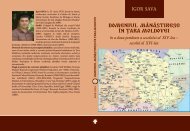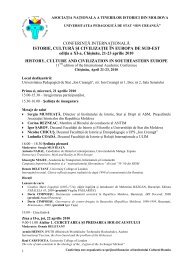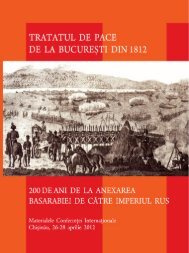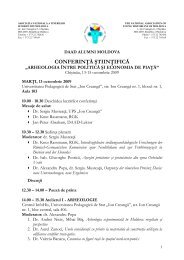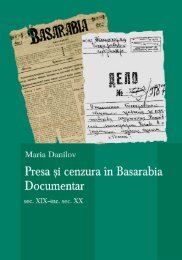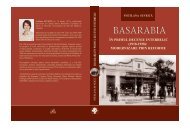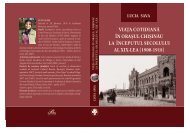Publicatie cu continut integral - Asociatia Tinerilor Istorici din Moldova
Publicatie cu continut integral - Asociatia Tinerilor Istorici din Moldova
Publicatie cu continut integral - Asociatia Tinerilor Istorici din Moldova
You also want an ePaper? Increase the reach of your titles
YUMPU automatically turns print PDFs into web optimized ePapers that Google loves.
unique historical way of Latgale – they did a lot for <strong>cu</strong>ltivation of theory about latviešu socialistiskā nacija. In<br />
the soviet period it meant assimilation of Latgalians and their integration to Latvian nation. But Soviet regime<br />
was oc<strong>cu</strong>pational and many or<strong>din</strong>ary Latvians and Latvian intellectuals also were in opposition to it. Latvian and<br />
Latgalian emigration was also anti-Soviet and pro-national orientated. That is why they developed other concepts<br />
of Latgale as lieux de memoire which were opposite to official Latvian socialistic canon which developed in conditions<br />
of ideological control and dictate from Russian one.<br />
Latgalian emigrants which left Latvia and lived mainly in America developed their own concept of Latgale<br />
– they tried to create their own intellectual space for their own needs and for their own Latgale. They also <strong>cu</strong>ltivated<br />
image of Latgale as Latgalian lieux de memoire. In this context we can presume that they developed their<br />
own project of Latvian identity. Among leaders of Latgalian émigré intellectuals was leonards latkovskis (1905<br />
– 1991). He understood that development of Latgalian identity is impossible without historical studies. Polemizing<br />
with other Latvian emigrants who denied independent status of Latgalian, Leonards Latkovskis paid great<br />
attention to historical studies of Medieval Latgalian history. He developed theory accor<strong>din</strong>g which Latgale was in<br />
the past separated from other Latvian lands, which belonged to Livonia and existed as a territory which in such<br />
situation was separated from the rest of Latvian lands. He also paid great attention to religious factor which he<br />
used for underlining of historical differences between different Latvian lands.<br />
Accor<strong>din</strong>g leonards latkovskis and other Latgalian intellectuals in exile who groped around Acta Latgalica 1 ,<br />
Protestant Reformation began in Latvia in the 1520s but Latgale in the same period denied from new faith and<br />
remained Catholic. He also underlined fact that in 1561 Latgale was acquired by Poland which governed it until<br />
1772. Polish rule in Latgale, which is famous in Poland as inflanty Polskie, also, due Latgalian intellectuals in<br />
exile, assisted to the rise of local unique features. Development of national historiography plays determined part<br />
in processes modern identity formation. That is why historical studies for Latgalian intellectuals in exile were the<br />
sphere where they were taught to nationalism. But this Latgalian project had its origins in Latgale. National positions<br />
of Leonards Latkovskis could be impossible without activity of some generations of Latgalian intellectuals<br />
in the past. Events of the 19th century were very important for formation of local concept of Latgale as Latgalian<br />
lieux de memoire. In 1865 Russian nationalistic orientated authorities banned printing in Latgalian 2 and later in<br />
some other national languages also. In the same time Latvian language of Vidzeme and Kurzeme, which used the<br />
German Gothic orthography was not banned.<br />
That is why different Latvian lands started developed also in different directions. Latgalians had to resort to<br />
handwritten books and the smuggling of books printed in Prussia, Lithuania and elsewhere. Latvians published<br />
their books and newspapers in Latvia and in Saint-Petersburg. The Latgalians were a repressed group in their<br />
own land. They could not own land, start their schools or serve in any official capacity. All public officials and<br />
schoolteachers were Russians, Polish or Latvians from other lands. Latgalian intellectuals developed their own<br />
narratives about Latgalian past but in the same time they try to integrate them in general Latvian context. But this<br />
context was different to context which is characteristic for Latvian intellectuals from Vidzeme and Kurzeme.<br />
So we can presume that Latgale was not only lieux de memoire, but also sphere in which Latvian intellectuals,<br />
belonged to different generations and groups, developed various concepts of Latgale in parti<strong>cu</strong>lar and Latvia in<br />
general. That is why Latgaleness was concept which intellectuals used for development of Latvian identity, its language<br />
and other <strong>cu</strong>ltural features. In such narrative Latvian traditions were traditions of Catholicism. Latgalian intellectuals<br />
did a lot for popularization of their own, alternative, project of Latvian identity. In the late 19th century<br />
local Latgalian, national orientated, intelligentsia appeared, mainly in exile – for example, in Saint-Petersburg.<br />
Catholic seminary in Saint-Petersburg was the center of activity for Latgalian intellectuals. Prominent figures<br />
of Latgalian national revival were Francis Trasuns, nikodems Rancans, Francis Kemps, Kazimers Skrynda and<br />
others 3 . They were founders and beginners of <strong>cu</strong>ltural and national awakening of Latgalians that began firstly in<br />
the Imperial capital Saint-Petersburg and later penetrated in Latgalian land also. After the repeal of the printing<br />
ban in Latgalian language in 1904 the first Latgalian newspapers and books appeared. Latgalian schools, economic<br />
cooperatives, theater groups and other organizations also appeared among local intellectuals. Schools and other<br />
1 BUKŠS, 1948, 1957, 1961; VALTERS, 1955.<br />
2 BREŽGO, 1944, BREIDAKS, 1992.<br />
3 KEMPS, 1910; SKRINDA, 1908.<br />
– 11 –



